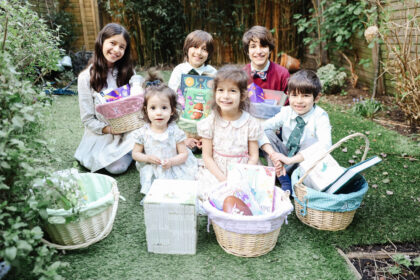Race can often seem like one of those taboo topics. There’s often a feeling that it’s better to ignore it than address it head on. So maybe you’re wondering why talk to kids about racism? Let’s talk about race and why we need to bring it up with kids.
This list is especially geared to white and white-passing families, as many BIPOC families (especially Black families) are already required to discuss for safety and self-preservation. But BIPOC families, especially non-Black families of color, can also use this list of reasons to motivate discussion and action. Here are 7 reasons why we should talk about race with kids.
Let’s Talk About Race: Why Talk to Kids About Racism
Kids start to learn racial bias early.
Data from the American Psychological Association shows that even infants notice race. Kids as young as 2-3 years old may segment groups based on race and attribute certain qualities to different racial groups. Even children as young as 3 months old can prefer same-race faces. Parents, on the other hand, often feel they don’t need to discuss race until children are 5+ years old. This is too late.
It’s crucial for parents to begin discussing race with even very young children. Even if we don’t want our society to be impacted by race, and even if we teach kindness to everyone, that doesn’t change the fact that people of different races do not have equitable outcomes in our society. It’s imperative that we discuss those inequities so that we can address them, and this can start with acknowledging the racial distinctions that even young children notice.
Kids are quick to learn.
Kids are made to learn. This study discusses kids’ ability to use both parts of the brain, and rewire in something called brain plasticity. That means that they’re capable of not only learning things like language, but also learning how to be antiracist. They’re great at learning new concepts of equity and advocating for others, and learning to act.
Kids also recognize they don’t know a lot yet. They’re aware that they’re still learning, which often makes them really willing to learn. They’re also willing to listen to stories of those impacted by racism and systems of oppression.
We can celebrate diversity.
Claiming everyone is equal in terms of power, privilege, and distinctions is false and dangerous. While we are all human, our lives experience ces vary greatly. Though race is not biological, it is an important social construct which kids WILL notice, so it’s important we give them the chance to notice the right things about it instead of attributing wrong things to it.
For instance, we can share Black musicians and learn about them. While their skin color did not impact their talent, it did impact their experience learning to be a musician. We all have different life experiences and are different individuals under the umbrella of humanity. It’s important we recognize and celebrate those contributions.
Kids live in racist systems.
Though many of us don’t want the systems we live in to be racist, they often are. For instance, Black mothers during childbirth at much higher rates. There are racial disparities in home appreciation. There are gross racial disparities in educational systems.
Since there are clear racial inequities in societal systems, let’s talk about race with kids. Let’s make sure we give them needed information to try to make those systems more equitable.
Kids are inclined to fairness.
“It’s not fair!” Kids often have a natural inclination towards fairness and justice. They often have an innate belief that all people are equal and should have equal opportunities and privileges. Let’s talk about race with them so they can use those beliefs to work toward actual equity.
We need to recognize BIPOC joy.
BIPOC joy, especially Black joy, is undervalued. Oppressive systems often communicate that the oppressed should not have that same joy – that they should be stuck in work, grit, and attempting to rid oppression. Claiming that joy and giving our kids an opportunity to see it legitimizes and encourages it.
Kids can have impact towards racial equity.
While kids can often feel they don’t have control over a lot, they can have impact towards racial equity. Whether impacting interpersonal racism or becoming aware of racist systems at a young age and working to fix them, they can become important agents for change.
If you’re unsure where to start, here are 8 simple antiracist actions for families as you begin your journey!
IF YOU LIKED LET’S TALK ABOUT RACE, YOU MIGHT LIKE THESE POSTS TOO:
- A-Z Diverse Global Picture Books for Kids
- The Real History of Thanksgiving for Kids
- Indigenous Peoples Day Resources for Families
DON’T NEED THIS POST ON WHY TALK TO KIDS ABOUT RACE YET? PIN THIS POST FOR LATER!












[…] Why Talk To Kids About Racism […]
[…] Why Talk To Kids About Racism […]
[…] Why We Need To Talk To Our Kids About Racism […]
[…] Why It’s Important To Talk To Kids About Racism […]